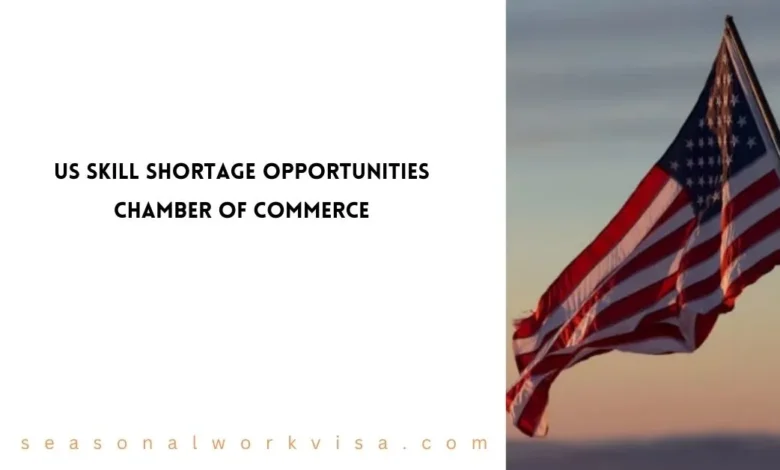US Skill Shortage Opportunities in 2025 Chamber of Commerce

Even while the U.S. economy is booming and creating jobs at a rapid pace, millions of jobs remain unfilled. The country is experiencing a historic talent shortage, with the industries most affected being professional and business services, healthcare, education, and hospitality, according to the most recent workforce data from the U.S. Chamber of Commerce. And 2025 might be your lucky break if you’re a skilled worker hoping to get employment in the United States.
Whether you’re looking for a job abroad or are thinking about changing careers in the United States, let’s analyse the facts, analyse the industries experiencing a crisis, and find out what this enormous labour gap implies for you.
The Big Picture: What’s Fueling the Shortage?
The labour economy in America has changed since the COVID-19 pandemic. The movement, which was once dubbed “The Great Resignation”, has changed its name to “The Great Reshuffle”, with tens of millions of people changing employment in pursuit of greater income, flexibility, and meaning. The gap between unfilled positions and available talent keeps growing even if hiring is outpacing quitting.
- There were 6.5 million unemployed people in the United States in 2024 alone, but a startling number of positions, especially skilled ones, are still unfilled.
- Two million more workers would be employed now if labour force participation had returned to pre-pandemic levels.
- All of the big industries are hiring, but not all of them are qualified.
Read Also: Cleaner Jobs in USA for Foreigners with Visa Sponsorship 2025
The Most Desperate Sectors With Skill Shortage Gaps
The most desperate sectors with skill shortage gaps in the U.S., based on the March 2025 report by the U.S. Chamber, include:
- Professional & Business Services
Jobs in this industry range widely, from IT, landscaping, cleaning, and waste management to legal and financial positions. With more than 1 million employment vacancies as of Q1 2025, it’s the perfect place for foreign workers with degrees or certificates in business, science, or information technology. - Education & Health Services
The industry is in great demand for K–12 educators, university professors, nurses, and therapists, particularly in areas with elderly populations or where post-pandemic learning gaps still exist. The need for educators and healthcare professionals has led to an all-time peak in hiring. - Leisure & Hospitality
Even with a high turnover rate (over 4%) this industry nevertheless hires over 1 million people per month. It is perfect for people looking for hands-on work because it offers a lot of in-person opportunities at hotels, restaurants, and popular tourist destinations. - Manufacturing
There are currently 622,000 open positions in the business, mostly in durable goods, after 1.4 million jobs were lost during the COVID pandemic. Skilled technicians, engineers, and craftsmen are in great demand, and knowledge in these fields is highly prized. - Financial Activities & Information Technology
Although there is fierce competition for top talent, this industry has lower quit rates. It works well for workers looking for remote or hybrid jobs in fields with strong demand for specific skills, such as cybersecurity, data science, and fintech.
US Needs You If You Are Qualified Skilled Worker?
For qualified individuals overseas, particularly those in industries with a severe talent shortage, the 2025 U.S. labor crisis offers a rare chance. Here are some reasons why 2025 would be a good time for you to relocate to the United States and some ways the nation is tackling its labor shortage:
Why the U.S. Needs Skilled Workers in 2025:
- Increased Visa Sponsorship: American companies are actively sponsoring more work visas, such as the well-known H-1B, O-1, and TN visas (for qualified North Americans). This is because American businesses are being forced to search abroad for talent due to a labor shortage.
- Remote and Hybrid Roles: Remote and hybrid With the growth of remote and hybrid job possibilities, especially in industries like consulting, IT, and finance, it is now simpler for international talent to work with American organizations without having to move right away.
- Open Doors for Foreign Credentials: Your international credentials may open doors in fields that traditionally required U.S.-based qualifications, as the U.S. Chamber encourages companies to increase their employment pools.
Where the Skill Shortages are Hitting Hardest:
Some states are experiencing a severe labor shortage, with less than 40 people for every 100 job postings, according to the Chamber’s Worker Shortage Index. Talent from both domestic and foreign sources is being actively sought after by these states:
- Utah
- Texas
- Florida
- North Carolina
- Tennessee
These states can be excellent choices for experienced people thinking about relocating to the United States since they have pro-business ecosystems, favourable tax laws, and cheaper living expenses.
Key Factors Contributing to the Shortage:
- A declining number of native workers and early retirements.
- immigration delays brought on by the pandemic that made it more difficult for foreign workers to enter the country.
- the shortage of qualified personnel in cutting-edge industries like sustainability, biotech, and artificial intelligence.
- geographical discrepancies between the availability of labor and the locations of jobs (such as transportation and construction).
The Solution: Global Talent and Upskilling
It will take time for domestic initiatives like hiring reforms, reskilling, and upskilling to completely alleviate the issue. In order to meet these demands in the near future, global talent—particularly highly qualified foreign workers—is essential.
U.S. Work Visas for Skilled Workers (2026):
Here’s an overview of the work visas you can apply for depending on your profession:
For Tech, Business, Science, and Finance Roles:
- H-1B Visa: For professionals in specialized fields (business, IT, etc.) who hold a bachelor’s degree or above.
- O-1 Visa: For people with exceptional talent in business, education, or the sciences.
- TN Visa: Under USMCA/NAFTA, this visa is available to qualified professionals from Canada or Mexico.
For Healthcare and Medical Roles:
- H-1B (Cap-Exempt): For healthcare roles at nonprofit or research institutions.
- J-1 Visa: For medical residencies, fellowships, or internships.
- EB-2 Green Card: For applicants with advanced degrees or exceptional abilities in shortage fields like healthcare.
For Manufacturing, Construction, and Skilled Trades:
- H-2B Visa: For skilled temporary employment outside of agriculture (e.g., welders, machine operators).
- EB-3 Green Card: For skilled professionals with at least two years of training or experience, an EB-3 green card is required.
For Hospitality, Food Service, and Seasonal Roles:
- H-2B Visa: For temporary jobs in cooking, cleaning, and hospitality.
- J-1 Intern/Trainee Visa: For individuals under 38 with relevant education or experience, the J-1 Intern/Trainee Visa is appropriate.
For Education and Academic Positions:
- J-1 Visa: For visiting teachers, scholars, and professors.
- H-1B: Often used by universities and K–12 schools for certified teaching professionals.
Full US Commerce of Chamber Findings
Conclusion:
2025 offers a fantastic chance for qualified foreign workers to find jobs in high-demand industries, including manufacturing, IT, healthcare, and education because the U.S. labour market is experiencing severe shortages in a number of industries. It is now simpler than ever for foreign talent to locate jobs in the United States because of increased visa sponsorship and remote and hybrid employment choices. Foreign workers can successfully position themselves for success in the American employment market by being aware of the industries that are most in need and the work visas that are accessible.
Frequently Asked Questions
What is driving the labor shortage in the United States?
The shortage is largely fuelled by a combination of early retirements, delays in immigration due to the pandemic, and a lack of qualified talent in emerging sectors like AI, sustainability, and biotech.
Which industries are most affected by the labor shortage?
The sectors experiencing the most significant skill gaps include professional and business services, healthcare, education, hospitality, manufacturing, and IT




